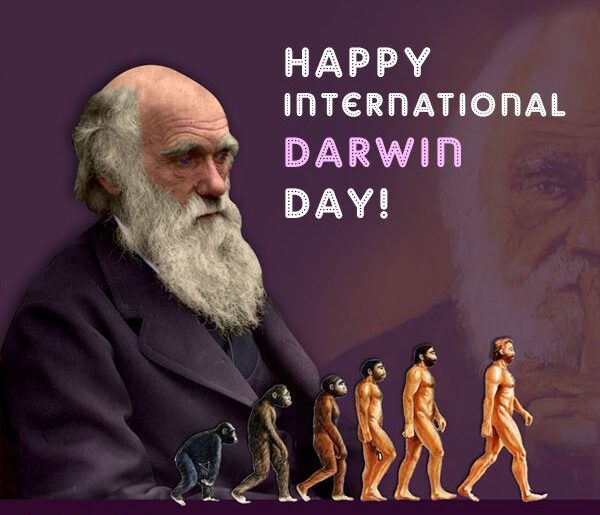Darwin Day: Celebrating Science and Evolution
Darwin Day: Charles Darwin, the renowned naturalist, is best known for his groundbreaking theory of evolution, which forever changed the way we understand life on Earth. His book, On the Origin of Species, published in 1859, introduced the idea of natural selection – the process by which species evolve and adapt over time. Darwin’s work laid the foundation for modern evolutionary biology and continues to influence scientific research today. Every year, Darwin Day, celebrated on February 12th, honors his contributions to science and encourages the public to appreciate the importance of scientific inquiry, knowledge, and discovery.
History of Darwin Day
Charles Darwin was born on February 12, 1809, in Shrewsbury, England, and from an early age, he developed a deep fascination with nature. After completing his studies at Cambridge University, Darwin embarked on a five-year voyage aboard HMS Beagle, during which he made observations that would later inspire his theory of evolution. His studies of the diverse species he encountered, particularly in the Galápagos Islands, led him to hypothesize that species evolve over time through natural selection.
Darwin’s revolutionary theory challenged long-standing beliefs about the creation of life and humanity’s place in the natural world. His ideas were controversial, but over time, they gained acceptance within the scientific community, and Darwin became a central figure in the study of biology.
Darwin Day, which is celebrated on February 12th, marks the anniversary of Darwin’s birth and serves as a global celebration of science, reason, and critical thinking. The first Darwin Day celebrations began in the early 20th century, and today, people around the world commemorate his life and legacy through educational events, public lectures, and discussions about evolution and science.
Significance of Darwin Day
Darwin Day holds immense significance not only for its celebration of a groundbreaking scientist but also for the ongoing importance of scientific progress and inquiry in society. Here are some of the key reasons why Darwin Day is so important:
- Promoting the Scientific Method: Darwin’s work exemplifies the power of observation, experimentation, and reasoning in understanding the natural world. Darwin Day emphasizes the value of scientific research in solving real-world problems and improving human knowledge.
- Celebrating Evolutionary Theory: The theory of evolution by natural selection is one of the cornerstones of modern biology. It has profoundly impacted our understanding of genetics, species diversity, and the interconnectedness of life on Earth. Darwin Day is an opportunity to reflect on how evolutionary theory has shaped scientific thought and continues to be a key framework in biology and other fields of study.
- Encouraging Critical Thinking: Darwin’s journey of discovery was rooted in critical thinking and questioning accepted ideas. Darwin Day reminds us of the importance of curiosity, skepticism, and the willingness to question established norms in order to advance knowledge and understanding.
- Fostering Science Education: Darwin Day provides an opportunity to inspire young people to pursue careers in science and research. Educational events held on this day encourage students to explore topics related to biology, ecology, genetics, and environmental science, fostering a new generation of scientists.
- Celebrating Human Curiosity and Innovation: Darwin’s life was defined by his quest for knowledge and his determination to explore the natural world. Darwin Day serves as a reminder of the human drive to understand the mysteries of the world around us and to innovate in order to address challenges facing society.
- Respecting Nature and Biodiversity: Darwin’s observations highlighted the incredible diversity of life on Earth and the interconnectedness of all species. On Darwin Day, people are reminded of the importance of protecting biodiversity and preserving ecosystems in the face of growing environmental challenges.
- Engaging in Public Discourse: Darwin Day also sparks discussions about the relationship between science, religion, and society. While the theory of evolution remains controversial in some circles, Darwin Day encourages dialogue and respectful debate about scientific discoveries and their implications for how we understand ourselves and the world.
Observing Darwin Day
Darwin Day is celebrated in various ways across the globe. Here are some common observances and activities associated with this day:
- Educational Events and Lectures: Schools, universities, museums, and scientific organizations often host events on Darwin Day to educate the public about Darwin’s life and work. These may include lectures, panel discussions, and exhibits on evolutionary biology, genetics, and the history of science.
- Public Debates and Discussions: Darwin Day is a time for public dialogue about the theory of evolution and its implications. Many communities host debates and discussions about the evidence supporting evolution and the relationship between science and religion.
- Documentaries and Film Screenings: Many media outlets air documentaries or films about Darwin’s life and his scientific contributions. These films provide insight into his journey of discovery and the lasting impact of his work.
- Science Fairs and Competitions: Schools and universities may hold science fairs or competitions in honor of Darwin Day, encouraging students to present projects related to biology, evolution, and the natural world.
- Online Campaigns and Social Media: In the digital age, social media platforms are often used to raise awareness about Darwin Day and promote discussions about the importance of science and evolution. Hashtags like #DarwinDay and #Evolution are frequently used to share educational content and engage with a global audience.
- Volunteering and Environmental Action: Some people observe Darwin Day by participating in volunteer activities that support environmental conservation and biodiversity protection. This could include tree planting, wildlife habitat restoration, or organizing clean-up events in local natural areas.
- Science and Nature Walks: Nature walks and guided tours in botanical gardens, wildlife reserves, or national parks are sometimes organized to help participants appreciate the beauty and diversity of life, which Darwin’s theory of evolution helped to explain.
Important Facts
- Charles Darwin’s Birthdate: Darwin was born on February 12, 1809, in Shrewsbury, England, making this date an occasion to honor his contributions to science.
- The Origin of Species: Darwin’s most famous work, On the Origin of Species, was published in 1859 and introduced the theory of evolution through natural selection.
- Voyage on HMS Beagle: Darwin’s five-year journey aboard HMS Beagle was instrumental in shaping his understanding of evolution. The observations he made on the Galápagos Islands played a key role in the development of his theory.
- Darwin’s Impact on Modern Science: Darwin’s work is foundational to the study of genetics, paleontology, and anthropology. His ideas continue to shape research in fields like medicine, ecology, and conservation biology.
- International Celebration: Darwin Day is celebrated by people around the world, from scientists to students, as a way of acknowledging the importance of Darwin’s work and the ongoing pursuit of scientific discovery.
Frequently Asked Questions (FAQs)
- What is Darwin Day?
- Darwin Day is a celebration of Charles Darwin’s birth and his contributions to science, particularly his theory of evolution by natural selection. It is observed on February 12th each year.
- Why is Darwin Day important?
- Darwin Day is important because it encourages the public to engage with scientific ideas, promotes the value of critical thinking, and celebrates the profound impact of Darwin’s work on modern biology and other fields.
- How can I celebrate Darwin Day?
- You can celebrate Darwin Day by attending educational events, engaging in scientific discussions, or simply reflecting on the importance of science and evolution in our understanding of life.
- What did Darwin’s theory of evolution contribute to science?
- Darwin’s theory of evolution by natural selection provided a unifying framework for understanding how species change over time. It revolutionized biology, genetics, and our understanding of the natural world.
- Is Darwin Day celebrated worldwide?
- Yes, It is celebrated in many countries around the world, particularly among scientific communities, educators, and individuals interested in the life and work of Charles Darwin.
Conclusion
It serves as a powerful reminder of the importance of scientific exploration, critical thinking, and the pursuit of knowledge. By celebrating the life and legacy of Charles Darwin, we honor not only his contributions to biology but also the broader impact of science on society. As we continue to explore the mysteries of life and the natural world, Darwin’s work remains an inspiration for future generations of thinkers, researchers, and innovators.










